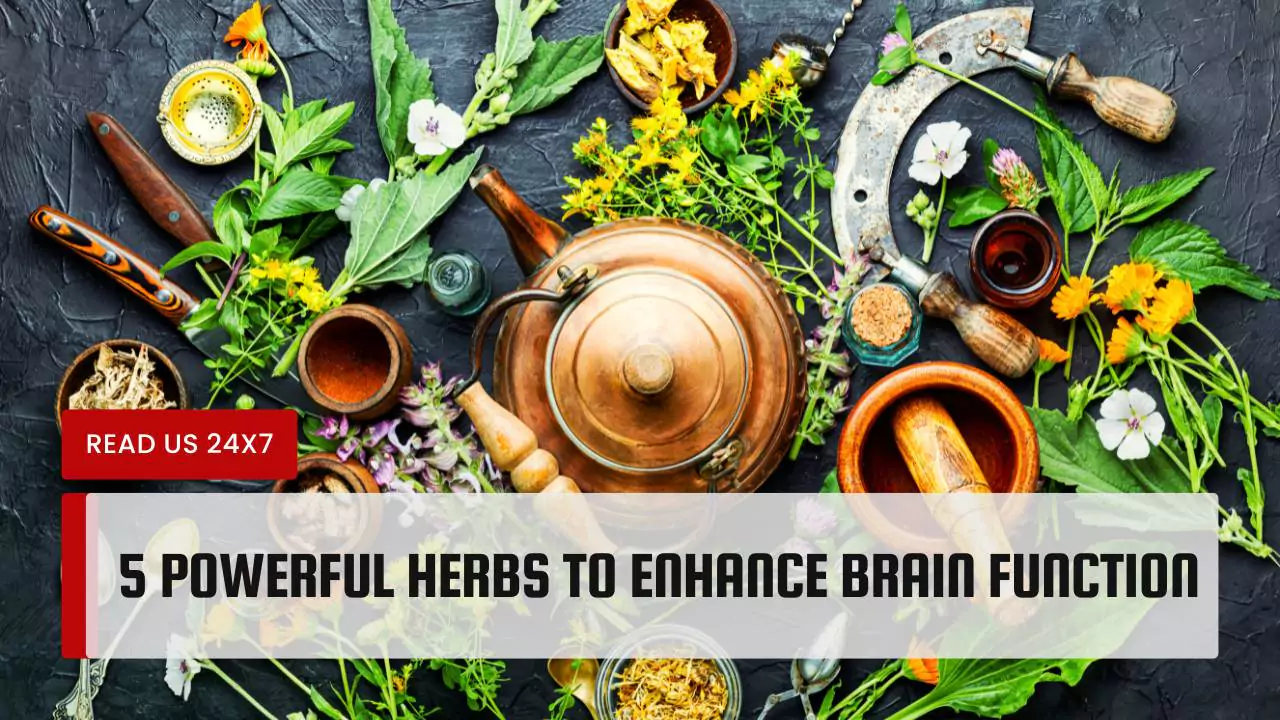Herbs have been used for centuries to boost brain function and improve memory. This article explores five powerful herbs that can enhance cognitive abilities: Brahmi, Ashwagandha, Turmeric, Gotu Kola, and Ginkgo Biloba. These natural remedies offer a range of benefits for brain health, from reducing stress to improving circulation and memory.
Exploring Herbal Remedies for Enhanced Brain Functioning and Memory
Brahmi: A Natural Cognitive Booster
Brahmi, also known as Bacopa monnieri, is a herb used in traditional Ayurvedic medicine. It has gained attention for its potential to enhance brain function. Studies suggest that Brahmi may improve memory, reduce anxiety, and boost overall cognitive performance.
Brahmi works by increasing the growth of nerve endings, which can lead to improved brain function. It also contains antioxidants that protect brain cells from damage caused by free radicals. Regular use of Brahmi may help improve learning abilities and enhance information processing speed.
Ashwagandha: Stress Relief and Brain Health
Ashwagandha is an adaptogenic plant with a long history of usage in Ayurvedic medicine. It is renowned for its capacity to alleviate stress and enhance cognitive performance. This plant possesses the ability to reduce cortisol levels, which serves as the primary stress hormone in the body.
Research indicates that Ashwagandha may improve memory and cognitive function in people with mild cognitive impairment. It may also help reduce symptoms of anxiety and depression, which can impact brain health. By promoting relaxation and reducing stress, Ashwagandha can create an environment for optimal brain function.
Turmeric: Powerful Anti-Inflammatory Benefits
Turmeric is a spice that has been used in cooking and traditional medicine for centuries. Its active compound, curcumin, has powerful anti-inflammatory and antioxidant properties that can benefit brain health.
Studies have shown that curcumin may improve memory and mood in people with mild, age-related memory loss. It may also increase the levels of brain-derived neurotrophic factor (BDNF), a type of growth hormone that functions in the brain. Low levels of BDNF have been linked to brain disorders such as Alzheimer’s disease.
Gotu Kola: Improving Mental Clarity
Gotu Kola is a herb that has been used in traditional Chinese and Ayurvedic medicine to improve mental clarity and cognitive function. It is known for its ability to enhance memory, concentration, and overall brain health.
Research suggests that Gotu Kola may increase blood flow to the brain, which can improve cognitive function and reduce mental fatigue. It may also help protect brain cells from damage and support the growth of new brain cells. Regular use of Gotu Kola may lead to improved mental clarity and focus.
Ginkgo Biloba: Support for Brain Circulation
Ginkgo Biloba is an ancient tree species, and its leaves have been utilized in traditional medicine for many centuries. It is recognized for its capacity to promote blood circulation to the brain, hence improving cognitive performance.
Studies have shown that Ginkgo Biloba may improve memory and cognitive speed in healthy older adults. It may also help reduce the risk of dementia and Alzheimer’s disease. The improved blood flow to the brain can lead to better oxygen and nutrient delivery, supporting overall brain health.
Key Benefits of Herbs on Brain Health
Cognitive Function Enhancement
The herbs mentioned above can help enhance various aspects of cognitive function. This includes improving focus, concentration, and mental clarity. By supporting brain health, these herbs can help individuals perform better in tasks that require mental effort.
Memory Improvement
Many of these herbs have shown potential in improving both short-term and long-term memory. They may help with information retention and recall, which can be beneficial for students, professionals, and older adults looking to maintain their memory function.
Reduction in Memory Loss Risks
Regular use of these brain-boosting herbs may help reduce the risk of age-related cognitive decline and memory loss. By protecting brain cells from damage and supporting healthy brain function, these herbs may play a role in maintaining cognitive health as we age.
Ways to Include Brain-Boosting Herbs in Your Diet
Using Supplements for Concentrated Benefits
Herbal supplements are offered in diverse formats, such as capsules, tablets, and powders. These capsules contain a high concentration of the bioactive chemicals present in the plants. Prior to initiating any new supplement regimen, it is crucial to adhere to the suggested dosages and get guidance from a healthcare practitioner.
Brewing Herbal Teas for Daily Intake
Many of these brain-boosting herbs can be brewed into teas. This is a simple and enjoyable way to incorporate them into your daily routine. Herbal teas can be a calming ritual that supports both mental and physical well-being.
Cooking with Brain-Enhancing Herbs
Some of these herbs, like turmeric, can be easily incorporated into your cooking. Adding these herbs to your meals not only enhances flavor but also provides cognitive benefits. Experiment with adding these herbs to soups, stews, and other dishes.
Employing Tinctures for Direct Benefits
Herbal tinctures are highly concentrated liquid extracts that can be diluted in water or consumed undiluted. They provide a fast and effective method for ingesting these cognition-enhancing herbs. Tinctures are sometimes more concentrated than teas and can be a suitable choice for individuals desiring more powerful outcomes.
In conclusion, these five powerful herbs – Brahmi, Ashwagandha, Turmeric, Gotu Kola, and Ginkgo Biloba – offer a natural approach to enhancing brain function. By incorporating these herbs into your diet through supplements, teas, cooking, or tinctures, you may experience improvements in cognitive function, memory, and overall brain health. As with any dietary changes, it’s wise to consult with a healthcare professional to ensure these herbs are safe for your individual needs.


